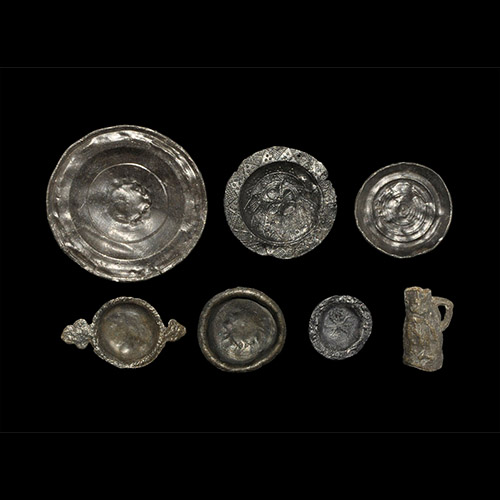Home > Stories by TimeLine Auctions
Stories by TimeLine Auctions
What’s Your Tipple?
Blowing froth from a pot brimming with best bitter .. or ... sipping China tea from ornate miniature cups at a dolls’ tea party?
What can those two pleasurable activities possibly have had in common?
Answer: PEWTER.
 From the early 17th century pewter tankards (the lidded versions of the pots) began to grow in popularity among labourers who caroused on Saturday evenings at alehouses and taverns across England. Pewter possessed the advantage of robust strength, a quality needed in the rough-and-tumble atmosphere generated by alcoholic fumes. When altercations broke out, fists clutching pot handles were the immediate weapons to hand.
From the early 17th century pewter tankards (the lidded versions of the pots) began to grow in popularity among labourers who caroused on Saturday evenings at alehouses and taverns across England. Pewter possessed the advantage of robust strength, a quality needed in the rough-and-tumble atmosphere generated by alcoholic fumes. When altercations broke out, fists clutching pot handles were the immediate weapons to hand.
A crack rendered any earthenware or stoneware pot unusable; and a heavy blow could spring leaks in a wooden pot. Pewter vessels, on the other hand, could fall to the floor and sustain no more than slight dents, easily repaired with a few taps of a hammer. Pewter lids on tankards – essential to keep dust, thatching fragments, even insects, out of the beer – could also take rough handling. (Lidded pewter pots lost their popularity when tile and slate roofs superseded thatch in the 19 th century, and alehouses improved in cleanliness.)
Pewter’s great drawback (leaving aside its lead content) lay in its versatility: it could be melted down and recycled. That single weakness made pewter beer pots prime targets for petty thieves. Throughout the entirety of Queen Victoria’s reign, scores of provincial newspapers reported on literally hundreds of cases of pewter beer pot thefts. Two cases must suffice here, for reasons of page space, to show the extent of the crime:
In 1891 a husband and wife team, Thomas and Alice Adams, were brought before the Clerkenwell Sessions where they pleaded guilty to stealing two pewter pots from the Vicar of Wakefield tavern in Bethnal Green. A police witness stated that the pair had stolen eight thousand beer pots across East London over four years. For most of that time they had evaded traps set at scrap metal merchants. Instead they had melted the pots themselves and cast the pewter into large ingots, later sold to plumbers in other parts of London. The judge sentenced the husband to two years hard labour; the wife to one year.
The second case, reported almost seventy years earlier, in 1824, brought pewter toy maker, Edward Bull of Lambeth, to Union Hall Courthouse in Southwark on a charge of buying-up stolen pewter pots, an offence under the Lead and Iron Act, in force at that date. Learning that Bull had attracted a gang of mudlarks by offering to buy scrap lead picked up on the Thames foreshore, the police kept a watch on his premises, hoping to catch him with stolen beer pots in his possession. In that they were unsuccessful; but police observations did confirm that the mudlarks often switched attention away from the river, and in the direction of crowded taverns on busy nights. The landlords of those taverns often reported increased pot losses on the same dates. The police waited patiently for the next rowdy night to come around; then they swooped on the toymaker’s premises armed with a search warrant. They found Edward Bull hard at work with his moulds and toymaker’s tools; surrounded by hundreds of freshly moulded miniature pewter plates, cups, saucers and other tea-set components. Yet not a beer pot in sight; only a stack of pewter ingots which the police took possession of and carried away for further investigation. In court the next day Edward Bull swore on oath that he had never bought a stolen beer pot or tankard. “The ingots the officers took away from my workshop last night were cast from melted down pewter buttons, broken spoons, worn-out inkpots, damaged candlesticks, pewter shoe-buckles, and unidentifiable scraps picked up by the mudlarks, for which I pay fair prices.”
The prosecution then called one of the investigating officers who had examined the pewter removed from the workshop. He told the court: “We had hoped to find fragments of partially melted beer pots in some of the ingots. When that failed to give us the evidence we were seeking, we decided to weigh some of the ingots. To our surprize, they fell into two groups by weight: each small ingot weighed precisely that of a one pint beer pot .. and each of the larger ingots had precisely the same weight as a quart pot.”
The jury found that Edward Bull's testimony was fake and therefore found him guilty. He forfeited his entire stock of pewter, and the furnace in which he had melted stolen beer pots. Only a hefty fine saved him from a lengthy stretch in prison.
Aaron Hammond (Chief Operating Officer), TimeLine Auctions, 30th May 2023




